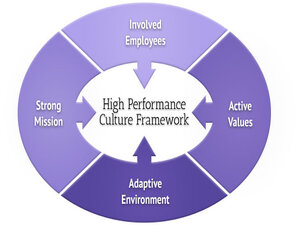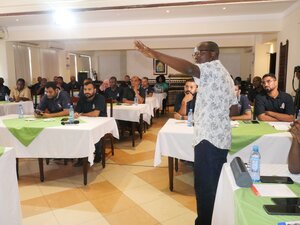Course Overview
How to Create High-Performance Teams Team leaders will benefit from training when learning the many strategies required to assemble a diverse group of enthusiastic individuals. Additionally, it will teach team leaders how to create high-performing teams by utilizing a variety of strategies and competencies.Team leaders will benefit from learning vital information and skills in this Building High-Performance Teams workshop. Along with a thorough examination of different team types, this course will also identify and analyze the five phases of team development, encourage and inspire team members, develop techniques for handling conflict and common issues, and much more!
High-performance teams have certain traits
- Formulating a team
- Group development phases
- Small group and individual exercises, facilitator presentation, group exercise “shapes” and review
Improving team dynamics to increase performance
- Introduction to Belbin Team Roles Descriptions of each Team Role’s Purpose Reviews of One’s Favorite Team Roles Group Discussion, Small Group Exercises, and Individual Self-Assessments Report on inventory
- Case study on creating a high-performing team
- Energizing workers
- Providing feedback on Internal team dynamics
- Case study review in small groups, group presentations, and discussions, as well as individual reflection exercises with co-coaching
Fostering a high-performance management culture for teams
- How to lead high-performing teams in nine steps
- Improving one’s management of team performance
- Activity, performance assessment, individual, Leading High Performing Teams
Constructing a strong vision
- How to formulate a strong vision
- How to communicate your vision
- Brief facilitator presentation, individual visioning exercise, presentation, and small group feedback
Changing your leadership approach
- Review of leadership philosophies and when to employ them
- adjusting to each individual and circumstance
- Discussion in groups, presentations, exercises in pairs, and personal reflection
Next actions
- Evaluation of the learning and the action planned
Support for the training will include:
- Pre-course reading or a pre-course survey, which is optional for participants
- A color workbook with an area for personal notes, advice, and techniques.



Course Objectives
- Describe the many forms of teams.
- Establish team standards by recognizing and interpreting the five stages of team development.
- Motivate and inspire your team
- Apply the twelve traits of a successful team to improve teamwork.
- By examining your team player style and learning how it affects group dynamics, you may foster trust and rapport.
- Recognize the essential components that lead a team from participation to empowerment, then impart these components to your team.
- Create tactics for resolving team disputes and common issues.
- Create teams utilizing TORI
- Become a solid team player.
- Communicate clearly.
- Use active listening techniques.
- Construct consensus through comprehension
Management & Supervisory Training Highlights
Training Feedback
Happy Customers
Course Outline
Lesson 1: Course Summary
- Greetings and Introduction
- Workshop Purposes
- Teams by Types
Lesson 2: Groups of Team Players
- Rational Questions
- Genuine Idealists
- Groups of Guardians
- inventive artisans
- The Relationship/Trust Model
Lesson 3: Tuckman’s Five Stages of Team Development
- Forming
- Storming \Norming \Performing \ Adjourning
Lesson 4: Applying Creativity
- Brainstorming
- Six Thinking Hats: Mind mapping and Brainwriting
Lesson 5: The Qualities of Great Teams
- Participation, Listening, Informality, and Clear Purpose
Lesson 6: Problem-Solving
- Identification of the Problem Decision Making Planning and Organizing
Lesson 7: Civilized Disagreements: A Quality of Great Teams
- Consensus judgments
- Regular Interaction
- Roles and tasks that are clear
Lesson 8: Resources for Team Planning
- SWOT evaluation
- Tools for Planning Improvement Plans
Who Should Attend
- Senior marketing directors or managers
- Relationship managers and
- Customer relationship managers
- Professionals in customer service, supervisors,
- Team leaders, and managers
- Sales experts, salespeople, and sales analysts
- Entrepreneurs and founders of startups
Trainers Available for:
- In-House Trainings
- Online Training
- 2 Hours Crush Program
- Half Day Program
- One Day Program
- Two Days Full Program
Training Techniques
- Power point Presentations
- Engaging conversations
- Case studies
- Exercises in solving problems
- Focus Group Conversations
- Games in Management
- Skits and modeling the part
Request a Quote

